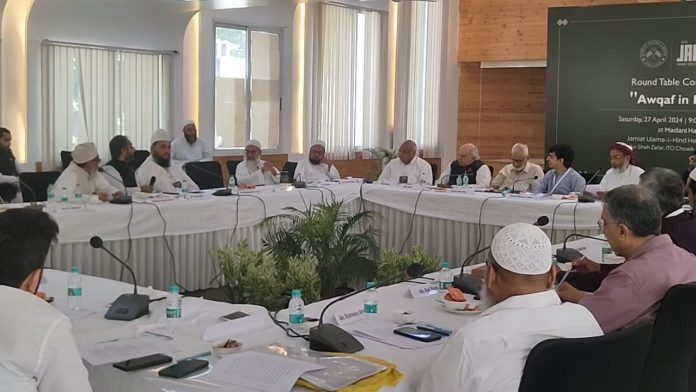– Abdul Bari Masoud
New Delhi, April 28: In a proactive move to protect and raise awareness about waqf properties across India, a committee chaired by Akram Al Jabar Khan, former Chief Commissioner of Income Tax for Pune, was established by Jamiat Ulama-i-Hind(M). This decision emerged from a roundtable conference convened by the organization on the theme of “Awqaf in India,” focusing on strategies to safeguard mosques, tombs, and uphold the Waqf Act amidst ongoing challenges.
Maulana Mahmood Madani, president of JUH, underscored the organization’s longstanding commitment to safeguarding waqf properties, dating back to the country’s independence era. He highlighted the collaborative efforts with Maulana Abul Kalam Azad and the subsequent enactment of the Waqf Act nationwide, aimed at preserving these charitable assets donated by Muslims for noble causes.
Addressing prevalent misconceptions surrounding waqf properties, Maulana Madani emphasized their lawful and charitable nature, refuting claims of illegal acquisition. He stressed the importance of rectifying these misconceptions and ensuring the rightful utilization of these properties for their intended charitable purposes.
To tackle existing challenges, the Jamiat Ulama Hind working committee formed a central committee tasked with engaging national stakeholders and devising a comprehensive action plan in compliance with the law. With the participation of experts from various states, a coordinated campaign is being prepared to educate the populace, particularly the younger Muslim generation, about the significance of waqf endowments.
Following extensive discussions, scholars advocated for political and legal interventions to safeguard waqf properties and rectify property records. Consequently, a committee was formed to spearhead activities and craft a strategic roadmap. Comprising prominent figures from law, academia, and administration, the committee will be led by Akram Al Jabar Khan and Owais Sultan Khan, with members including legal experts, retired officials, educationists, and historians.
During the conference, esteemed individuals shared their insights and suggestions, contributing to the strengthening of the waqf movement. The proceedings, moderated by Owais Sultan Khan, concluded with closing remarks from Maulana Hakimuddin Qasmi, expressing gratitude to all participants for their valuable contributions.
The initiative underscores a collective effort to safeguard and promote the noble cause of waqf properties in India, reflecting a commitment to preserving charitable assets for the betterment of society.




